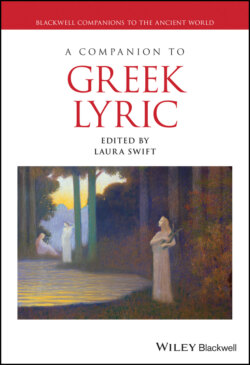Читать книгу A Companion to Greek Lyric - Группа авторов - Страница 55
Greek Aristocracy as a Cultural Phenomenon
ОглавлениеAt the beginning of this essay, I have quoted N. Fisher and H. van Wees, who rightly emphasize two important factors to be taken into account when thinking of archaic and classical Greek elites, namely the absence of a strong external authority and the lack of mechanisms of stable transmission of wealth. To put it differently, potential sources of one’s sudden economic success and potential mechanisms of a long-term accumulation of wealth were scarce in archaic and early classical Greece. When combined with the fact that only citizens at large constituted a legally defined social order, it becomes understandable that (1) the economic threshold for joining the ranks of (aristocratic) elite must have usually been relatively low, that (2) the composition of such elite groups must have been relatively unstable, and that (3) specialized “cultural capital” must have played an unusually important role in promoting and securing one’s social advance.
To conclude this essay, let me briefly consider two important implications of my previous argument. Firstly, the predominantly cultural mechanisms of social recognition of Greek aristocrats naturally tended to create a wide network of strong personal ties between individuals across the Greek Mediterranean and the Black Sea region. The aristocratic cultural idiom became the lingua franca of the “small Greek world.” Secondly, the same aristocratic culture became a common gauge of social advancement and prestige for entire Greek civic communities.
One can test the former idea by taking a look at the list of the (fragmentarily) preserved poets of the archaic period, whose work was either directly produced to be performed at symposia or could potentially be quoted or discussed at symposia. What immediately strikes us here is the pan-Hellenic provenance of these poets, or better, their wide geographic distribution on the map of the archaic and early classical Greek world. Notwithstanding their place of origin, their compositions seem to have been sung in almost every corner of the (Greek) Mediterranean. At first, this may partly be due to the well-known phenomenon of migrating poets, such as Anacreon or Xenophanes. But migrating poems must have been a much more important phenomenon. Briefly put, sympotic (or potentially sympotic) poetry, testifying to one’s competences in this crucial branch of aristocratic lifestyle, must have been a common currency for all those who thought of themselves as aristocrats—both abroad, but more particularly at home, where following cultural novelties (recent poems of renowned poets) and parading them among one’s social peers was an instrument of aristocratic competition and prestige.
As far as the second implication of this essay is concerned, I would argue that some of the fundamental and historically most influential aspects of the aristocratic culture were due to the fact that its various manifestations, notwithstanding the original circumstances of their production or of their performance, had been created in order to be “consumed” by the representatives of social elites and by the “commoners” in their respective social circles. In other words, the aristocratic culture of the archaic and early classical period was attractive and influential far beyond the its own milieu.23 This was not simply due to the natural appeal of “higher” cultural models, but most importantly anchored in the mechanisms of social advancement in the Greek communities of the time.
Ultimately, then, by aristocratic culture I mean the overall “cultural capital” indispensable to seal one’s elite status or to promote one’s social advancement to achieve this status. Accordingly, both the remarkable social mobility within archaic Greek communities and the extraordinary geographical spread and geographical mobility of the archaic Greek culture were due to the predominantly aristocratic character of this culture. One of the most important riddles of early Greek history, i.e., the essential cultural uniformity of archaic and early classical Greek civilization achieved and maintained despite the fundamental (geographic and political) fragmentation of the Hellenic world, can perhaps be accounted for from this perspective. The unity in question was primarily due to the aristocratic culture that provided a common denominator for the universally valid modes of social recognition—both for individual aristocrats striving to secure their position among their peers and for the commoners at large, striving to find their way into the ranks of their local elites. As a result, cultural novelties travelled extremely fast into every corner of the Greek world since those ready to “praise that song the most which comes the newest to their ears,” as Homer puts it (Od. 1.351–352), were to be found both among the aristocrats and among the commoners across the Mediterranean and the Black Sea region.
*
As a coda to this paper, one may rightfully ask oneself if two crucial characteristics of the Greek, and especially Athenian culture of the classical era, namely its constant drive for novelty and its integrative force combining the appeal of a popular and an elite culture— characteristics at least partly responsible for the universal allure of this culture ever since—were not rooted in the aristocratic culture of the archaic period as analyzed in this essay. But this is another story.
